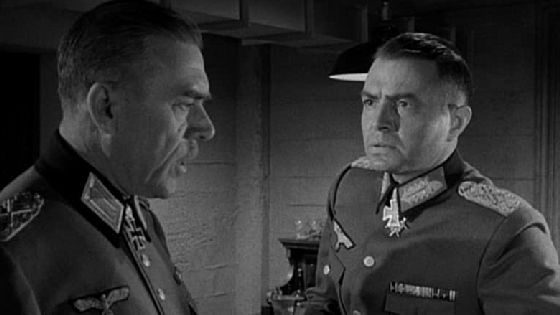The Desert Fox: The Story of Rommel (1951) 

Director: Henry Hathaway
Cast: James Mason, Cedric Hardwicke, Jessica Tandy
Synopsis: The life and career of the respected World War II German general.
Although it initially seems strange for an American studio (Twentieth Century-Fox) to produce a sympathetic biopic about an influential German officer just six years after the end of hostilities in 1945, a look at The Desert Fox: The Story of Rommel shows that it focuses most of its running time on Field Marshal Erwin Rommel’s involvement in the plot to assassinate German Fuehrer Adolf Hitler in 1944. Most other details about Rommel’s career up to 1943 are either glossed over or ignored completely, which goes some way to explaining how the movie got made so soon after the war. Despite this, there were still plenty of protests over its release, and concerns were raised regarding its release in Germany in 1952.
The part of Rommel is played with straight-backed dignity by James Mason, who would play the part again two years later in The Desert Rats. A brilliant military strategist, Rommel is admired by all – even British officers, one of whom respectfully salutes the Field Marshall as he chows down on a sandwich in the desert. That officer is Desmond Young (who actually plays himself here), the man who, after the war, wrote the biography on which this account of the last years of Rommel’s life is based.
The movie takes as its starting point the disastrous (for the Germans) El Alamein campaign during which Rommel defied Hitler’s orders to fight to the last man and ordered a retreat. For this refusal to obey orders, Rommel receives a humiliating dressing down from the Fuehrer. Although we are not witness to this tongue-lashing we hear all about it when Rommel relays the details to his wife Lucie (Jessica Tandy) and old friend Dr. Carl Strolin (Cedric Hardwicke). Unbeknownst to Rommel, Strolin is under Nazi surveillance, and is suspected of possibly being an enemy of the state, which might explain why, when Lucie has left the room, he asks Rommel if he still feels safe around Hitler and has he ever considered what might happen to his wife and teenage son should he fall out of favour with the Fuehrer.
The fact is, Rommel is starting to have his doubts, and these doubts are multiplied when he learns from veteran campaigner Field Marshal Gerd von Rundstedt (Leo G. Carroll, giving a fine performance) that Hitler plans to personally orchestrate the defence of Normandy from Berlin. Becoming increasingly torn by his sense of duty as a soldier to his superiors on the one hand and his knowledge of military strategy which tells him that all is lost and any prolonging of the war will result in thousands of needless deaths, Rommel sounds out the Rundstedt about what he thinks of the rumoured plot to kill the Fuehrer. However, the wily old dog is too wise to be drawn, even if it’s clear he tacitly approves of the plot…
The Desert Fox: The Story of Rommel was written by its producer, Nunnally Johnson, and boasts an intelligent, articulate script which perhaps shows Rommel in a more heroic light than he actually deserves. The extent of his involvement in the plot to assassinate Hitler is still unclear, but Johnson’s script somehow contrives to depict him as a major player while also keeping him firmly removed from most of the actual plotting, even though he does appear to give the nod for the actual plot to get under way. Apart from the assassination scene, we see Hitler (Luther Adler) only one time, during which he is gripped by a rage he is barely able to contain, which is both a misleading impression of the man (by this time in his life, Hitler was a physical wreck dependant on medication to prevent him from shaking) and presumably intended to show Rommel in an even favourable light when he decides to effectively turn traitor. Because let’s not kid ourselves that Rommel and the other plotters were motivated by an altruistic compulsion. They would have tried to kill Hitler in 1939 when it became clear he was leading them into war if that was the case. They were happy enough to invade and subjugate the populations of other nations under Hitler’s leadership when Germany looked like winning the war; it was only when things started going wrong and it became obvious they had no hope of winning that they suddenly developed humanistic consciences.
Mason gives a memorable performance as Rommel, managing to convey the emotion beneath the calm exterior without resorting to showy tricks. He’s aided by Johnson’s polished script, which tells us as much about the man’s fortitude and strength of character through his conversations with his family than with other military men. For example, during a few moments alone with his wife shortly after learning that he has no choice other than to commit suicide in order to protect his family, Rommel asks his wife to pass him his scarf. ‘It’s cold and I don’t want to shiver,’ he says. It sounds like a throwaway line, but it’s actually another indication of the way that a proud and noble officer like Rommel would think, even when under extreme stress. He isn’t concerned about feeling the cold when he leaves the house – he doesn’t want his escorts to mistakenly think he is frightened when he accompanies them.
(Reviewed 5th December 2013)
httpv://www.youtube.com/watch?v=185vCvsvEP8
